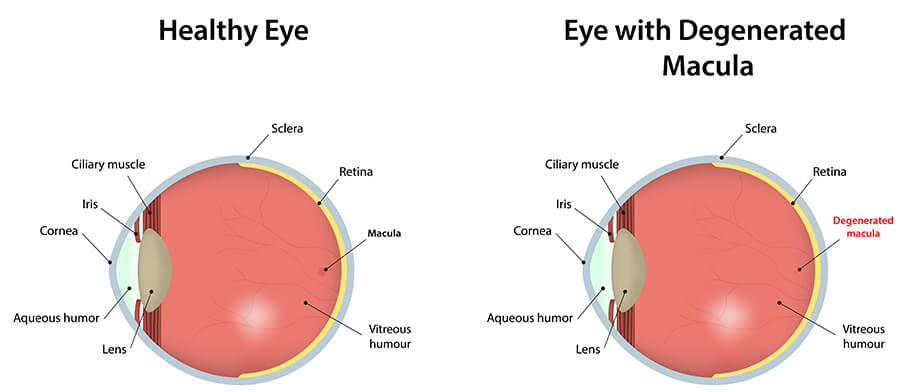Age related macular degeneration (ARMD) is one of the leading causes of vision loss among seniors. The vision loss is usually permanent but will not lead to total blindness. It is a disease that affects the retina which is a thin layer of tissue at the back of the eye. The retina is like the film inside a camera, when light hits the film a picture is formed.
The vision that is associated with the retina has two parts. The central vision and the peripheral vision. The central vision is like the “bulls eye” at the center of the retina. This area is called the macula. The macula is responsible for detail vision such as reading, watching television, recognizing faces and reading street signs.

The peripheral vision or side vision is responsible for seeing the surroundings. It is the macula that is affected when you have ARMD. If you had ARMD you would be able to see a person standing and you could describe the colors of their clothing (peripheral vision) but you could not recognize their face (macular or central vision).
There are two types of macular degeneration, the “dry type” and the “wet type”. The dry type is more common, less severe and the degeneration is usually slow. With the wet type, the vision loss is quite rapid and usually severe but it only occurs in about 15% of the cases. It is only for the “wet” form that laser treatments or medications may help if done early. There is no cure for either form of macular degeneration and in all cases the vision will slowly worsen.
Macular degeneration tends to occur in persons of Northern European extraction, especially those with light colored eyes and light complexions. Researchers also seem to agree that the cumulative damaging effects of the sun’s ultraviolet light seem to play an important role in speeding up the degeneration. A good pair of sunglasses that have a full UV filter and are large enough to give good coverage is advisable. There are also other factors that may play a role with ARMD, such as smoking and alcohol. Vitamins may play a role in stabilizing the degenerative process.
Some seniors simply accept their vision loss as a natural aging process and do not seek proper care. They seem to have “the nothing can be done” attitude. There is a lot that can be done. The first step is to consult with your eye doctor to get the proper medical care, advice and the best possible eyeglasses prescription. Then you might seek the help of a low vision specialist for products and services that may be available to assist you.
These products or assistive devices can be categorized by what they do. Near vision devices magnify images so as to enhance your close range vision like reading and playing cards. There are many devices that serve this need depending on the application and the patient’s preference. They include hand held magnifiers, illuminated magnifiers, high power reading glasses and video magnifiers.
Distance viewing devices are mainly telescopes and binoculars and may be used to help someone watch television, go to theater or read street signs. These will only help in very limited instances and will not enable you to drive. Another device category is illumination control devices such as selective filter lenses that help control the amount and the type of light that enters the eye. The lenses are designed to provide a high degree of contrast to optimize the vision and can dim down a bright sunny day or can brighten and enhance indoor or dim conditions, UV 400 amber lenses are an example.
The final category of devices are non optical in nature. There are hundreds of these devices to help with daily tasks such as large print books, computer software programs to enlarge print on a monitor, line guides to help in writing more legibly and large bold print checks available from most banks.
As can be realized, there are many products available to help seniors with macular degeneration. There is not one”magical” product that will solve all vision problems. It is quite common to have a variety of products to aid in different tasks. The role of your low vision specialist is not to restore the vision you have lost, but to make the most of the remaining vision. Some items may be subsidized by the government if you qualify.

 (603) 524-2020
(603) 524-2020 Order Contact Lenses
Order Contact Lenses Pay Your Bill Online
Pay Your Bill Online



